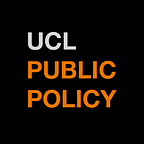How COVID-19 is affecting policy engagement — and how we’re responding
By the UCL Public Policy Team
2020 is, and will continue to be for some time, a challenging and demanding time for us all, with the COVID-19 outbreak dominating not just headlines but lives across the globe.
There is growing certainty that the world will be a very different place once we emerge from the pandemic, with returning to ‘normal’ or ‘business as usual’ now seemingly impossible — presenting us with an opportunity to redefine the way we live and work.
All eyes and ears remain focused on the Government’s policy response to the virus, with the role of evidence and expertise in policy and decision-making during this time more crucial than ever before.
As lockdown continues, life has been put on hold for many; for others, this measure only brings much more clearly into focus pre-existing issues like inequality, most notably in regards to health risk, income and access to space.
For all of us at UCL, life has far from stopped, with many of us playing a shaping role in helping tackle the virus and its impacts and lending our relevant expertise to informing a COVID exit strategy — from vaccine development and rapid testing, to the Green New Deal and home schooling.
The UCL Public Policy team are working to ensure UCL’s research can continue to inform ongoing policy issues, as well as those related to COVID-19. Whether or not your research directly links to the outbreak or combatting its effects, we are still here to assist with academic-policy engagement, including submissions to select committees, connections to policy professionals, response to Areas of Research Interest, training and guidance and facilitating engagements in areas from climate to industrial strategy to health and social care.
George Dibb, Head of Industrial Strategy & Policy Engagement, is continuing to work with academics from across UCL on how governments can respond to the COVID-19 crisis with innovation policy, industrial strategy, and an economic response. George’s work includes supporting transformational policy proposals around decarbonisation, such as those from the UCL Institute for Innovation and Public Purpose and the UCL Green Innovation Policy Commission, and UCL work continues to inform the economic response to COVID-19 to ensure that it can also help drive the economic transition to a net-zero economy.
Audrey Tan, UCL Public Policy’s new Public Policy Engagement Facilitator, is coordinating the organisation of the AI for People and Planet policy roundtables, which will bring together leading researchers, policy professionals, and business and charity leaders to shine a light on the transformational effects of artificial intelligence on society and the COVID-19 crisis. Audrey is also coordinating the Policy Champions Network, a group of academic, research and professional services staff across UCL who act as ambassadors for academic-policy engagement, to share best practices and re-envision the role of policy engagement in the present and post-COVID era. Audrey is also working to build capacity for policy engagement across early career researchers and under-represented groups across UCL School of Life and Medical Sciences (SLMS).
Katherine Welch, Head of External Engagement and Partnerships, continues to work across UCL Public Policy and the UCL Grand Challenges, working with both teams to build partnerships and engagement beyond UCL to tackle the future challenges we all will face. Katherine is currently leading on a number of projects looking at a post-COVID-19 society including sustainability and climate change, AI and the future of work, place, ‘levelling up’ and the role of universities in wider society.
Olivia Stevenson, Head of UCL Public Policy, leads the team, giving shape and direction to our work. She supports the positioning of public policy at UCL, including providing strategic advice across the university on how to continue to engage with public policy with-in and beyond COVID-19. Inequalities have never been more acutely felt as a result of coronavirus and so with the Grand Challenge of Justice and Equality, Olivia continues to drive the consideration of intersectional inequalities in how we rebuild our society and economy. With members of the Universities Policy Engagement Network (UPEN), Olivia is currently leading the Diversity and Equalities strand of the network, which is looking at ways to bring diversity of thought to academic-policy engagement.
Evie Calder, UCL Public Policy’s Communications Officer, is continuing to work with UCL researchers and professional services staff to have their work published in media outlets such as Times Higher Education, Wonkhe and The Conversation, as well as organising training opportunities for staff looking to communicate their research to a wider audience.
With a wealth of resources, knowledge and contacts throughout government and parliament, our aim is to ensure that UCL’s world-leading research can continue to play a role. Whether you’re experienced in this area or just starting out on your policy engagement journey, we are committed to facilitating diverse forms of engagement and would like to hear from you. You can get in touch directly with members of the team, or email us at public-policy@ucl.ac.uk.
_______________________________________________________________
Further information and resources
UCL COVID-19 calls:
- UCL Grand Challenges COVID-19 Initiative
Government Consultations and Parliamentary Inquiries:
- Open Government Consultations
- Find an inquiry
- Bills before Parliament 2019–21
Resources:
- UCL Public Policy’s ‘How-To’ Guides
- Universities Policy Engagement Network (UPEN) website
- The House Live
